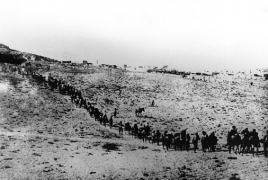Armenian Genocide not up for debate in ‘Intent to Destroy’- Jewish Journal November 9, 2017 - 12:56 AMT PanARMENIAN.Net - There’s no question among reputable scholars and historians that the slaughter of 6 million Jews during World War II constitutes genocide. So why, after a full century, is it still considered controversial to declare the murder of approximately 1.5 million Armenians a Genocide? That’s the driving question of award-winning filmmaker Joe Berlinger’s scathing new documentary, “Intent to Destroy”, which opens in Los Angeles on Nov. 10 and eviscerates Turkey’s campaign of denial, The Jewish Journal says in its review of the new documentary. The film’s title comes from the international legal definition of genocide, in which acts of violence are “committed with intent to destroy, in whole or in part, a national, ethnical, racial or religious group.” Berlinger explores why, despite volumes of evidence of the Ottoman government’s systematic extermination of Armenians from 1915-23, the present-day Turkish government still is determined to suppress the issue. Several countries, including the United States and Israel, refuse to fully recognize the genocide in order to maintain a strategic military and economic alliance with Turkey. “Intent to Destroy,” which won the best documentary film award at 2017 DOC LA — The Los Angeles Documentary Film Festival, is a documentary hybrid. The movie includes elements of a traditional documentary, including archival interviews with survivors and black-and-white photographs depicting scenes of carnage. There are also interviews with historians and activists who describe the events of the genocide and the century-long efforts to repress those facts. But what makes “Intent to Destroy” different from past documentaries on the subject is the “structural springboard,” as Berlinger calls it, of a behind-the-scenes look at the making of a 2016 feature film about the Armenian genocide, “The Promise,” starring Christian Bale and Oscar Isaac. Berlinger is Jewish and has “always been kind of obsessed with the Holocaust,” and that led him to learn more about the Armenian genocide that preceded it. He knew the Ottomans also had deported Armenians in cattle cars to concentration camps, forced them on death marches and carried out mass executions — with assistance from the German military. “Many of the deportation orders are actually signed by … German military officers that went on to have illustrious careers in the Third Reich,” Paul Boghossian, a professor at New York University, says in the film. “It’s very clear that German ideas about population control stemmed partly from their experience in the Ottoman empire.” Berlinger knew that on the eve of the Nazi invasion of Poland in 1939, German Chancellor Adolf Hitler instructed his officers to kill Polish men, women and children without mercy, stating rhetorically, “Who, after all, speaks today of the annihilation of the Armenians?” Berlinger’s films tend to focus on events happening in real time, such as the “Paradise Lost” trilogy about three teenagers wrongfully imprisoned for murder; “Some Kind of Monster,” spotlighting the rock band Metallica; and “Chevron,” which explores the environmental lawsuit filed by Ecuadorians against the oil giant. He had been interested in the Armenian story for a long time, but didn’t know how to tell it until he heard about “The Promise.” “Intent to Destroy” also explores how Turkish pressure has made it so difficult for Hollywood filmmakers to tell the Armenian story. Franz Werfel, a refugee from the Holocaust, wrote the 1933 best-selling historical novel “The Forty Days of Musa Dagh,” which told of an Armenian community that fought off Turkish soldiers until the French Navy rescued them. He penned it as a historical cautionary tale to warn the world about Hitler as the Nazis were consolidating power in Germany. The foreign ministers of Armenia and Azerbaijan, Ararat Mirzoyan and Jeyhun Bayramov, have arrived in Washington. The CSTO budget for the current year requires adjustments due to the refusal of Yerevan to pay their share of contributions. Six total incidents have burned 19 old-growth trees. Friday night 8 trees were torched along the beautiful main entrance. The EU does not intend to conduct military exercises with Armenia, Lead Spokesperson for EU Foreign Affairs and Security Policy Peter Stano says. Partner news |